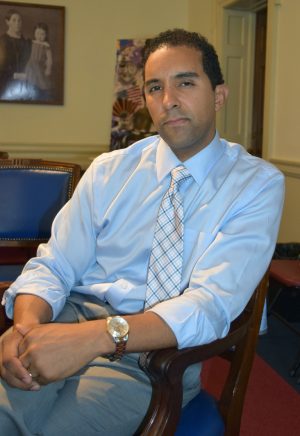The Mount Vernon Industrial Development Agency bulked up and toughened up at its annual reorganization meeting on Jan. 31.
It bulked up by hiring two employees and two consultants. It toughened up by introducing a more detailed financial assistance process.

“We can”™t develop the economy with an army of one,” Mayor Richard Thomas, the IDA chairman, said after the meeting. “This is a team of teams to help coordinate projects across the city.”
The army of one refers to Sean McIntrye, who was hired as interim executive director in August to replace the agency”™s sole employee, Margaret Finlayson.
On Tuesday the board appointed Maria Donovan as strategic director, at $95,000 a year, and Roberta James as business development director, at $86,000 a year.
Donovan, who was already serving as special counsel to the mayor, will manage long-term policies, oversee key initiatives, implement the mayor”™s economic development agenda and develop marketing materials.
James, who had worked on Thomas”™ mayoral campaign in 2015, will do market research, monitor the city”™s growth, collaborate with the business community and identify business opportunities.
The board also hired two consultants.
Daniel Macom, president of DJM Inc. in Riverside, Connecticut, will provide branding, messaging and other media services for $85 an hour. Universal Engineering Services in White Plains will work with the IDA and other city departments on code enforcement issues for $150 an hour.
The board approved the positions by 4-to-1 votes. Comptroller Maureen Walker opposed them.
Thomas said an annual state allocation from Empire State Development — $1.1 million this year — will cover the cost of the new positions. He said more people could be added later. “Their roles will pay for themselves,” he said.
Until now, no one has been in place to coordinate big city projects, Thomas said, or focus on time-consuming business development.
Homeowners account for 77 percent of tax revenues, “and that”™s unsustainable,” Thomas said. He said cultivating small-business growth would diversify the economy and shift the tax burden away from homeowners.
Citing a 2011 state study that said Mount Vernon could expand its business base by $210 million, the mayor said the city could increase sales tax revenue by $12 million to $15 million.
Even paperwork can make a difference in his economic development scheme.
Developers who want financial assistance from the IDA submit a three-page form. The IDA is working on a 32-page form. The new application would require a tougher cost-benefit analysis, more financial details and assurances that financial assistance can be stopped if a project doesn”™t produce the agreed-on benefits.
The IDA, Thomas said, has made sweetheart deals, given up too many benefits and put too great a burden on the community.
He cited the new La Porte Apartments – Atlantic Development Group’s $60 million, 14-story project at 203 Gramatan Ave. that includes 159 units of affordable workforce housing and 20,000 square feet of retail space – as an example of a project that he thinks doesn”™t make sense for the city. If it turns out that the terms of the deal are not met, he said, the IDA would explore whether it can break the contract.
Thomas also derailed a presentation of an auditor’s report on IDA finances in 2014 and 2015. He said the report, by Yeboa & Lawrence LLP, a Pelham accounting firm, should first be reviewed by Ruskin Moscou Faltischek, a special auditor hired in August to inspect the IDA.
State Comptroller Thomas DiNapoli in 2014 issued an audit critical of the Mount Vernon IDA that highlighted missing paperwork, inadequate project monitoring, missing tax payments and a shortfall of 671 jobs promised by developers from 2012 to 2013.
Tripling the staff, implementing tougher financial assistance standards and examining past practices are part of an effort to put the IDA at the center of Mount Vernon”™s economic development strategy.
The IDA, Thomas said, will be Mount Vernon”™s “economic engine.”




















All he did was shift current employees into positions that they are not qualified nor experienced to handle. The money he received from Empire should have gone to fixing the City’s infrastructure and not salaries. His priorities in helping the City of Mount Vernon seem questionable to say the least.